TBS Quarterly Record 596 - Trinitarian Bible Society (Australia)
TBS Quarterly Record 596 - Trinitarian Bible Society (Australia)
TBS Quarterly Record 596 - Trinitarian Bible Society (Australia)
- No tags were found...
You also want an ePaper? Increase the reach of your titles
YUMPU automatically turns print PDFs into web optimized ePapers that Google loves.
Issue Number: <strong>596</strong> – July to September 2011the integrity of the Word of God and fortruth, and even as this came across, theymaintained calm demeanours.The debate began with Jack Moormanpresenting his reasons for supporting theAuthorised Version and its underlying texts.He focused on the theological aspects oftranslations and texts. The AV has beenthe standard for four hundred years—anaspect the modern versions cannot claim.It is very accurate to the Greek and Hebrewtexts which God had originally inspired andwhich have been providentially preserved.These texts are based in the New Testamenton the majority of manuscripts which havebeen found throughout the medieval worldrather than on a small group of manuscriptsfrom Egypt.In keeping with God’s promises that Hispeople would always have His Word, thismajority of manuscripts have been availablethroughout church history (rather thanhidden away in monasteries and librarieslike the major Alexandrian manuscripts).Furthermore, printed editions of theGreek New Testament text representingthis majority—which in time came to beacknowledged as the Received Text—havebeen produced almost since the verybeginning of the printing process. Printededitions of the Alexandrian texts, however,did not become available to the churchuntil the late 19th century. Additionally, theTextus Receptus is some 2,900 words longerthan the Alexandrian, making it moredoctrinally full and cohesive.James White responded by noting that notwo manuscripts are identical: there arecopyist errors in every manuscript. However,he stated that this does not deter him frombelieving in and defending the inerrancy ofthe <strong>Bible</strong> as the Word of God. His concern,however, is that the King James VersionOnly Movement 2 removes the accuracy andauthority of Scripture. He noted that the AVwas not immediately accepted: it was not27the <strong>Bible</strong> of America, and took time even inEngland to overtake the Geneva.Dr White further stated that, in consideringthe texts used by the Authorised Versiontranslators, it should be noted that theydid not know anything about text-types:the differentiation between texts is a fairlymodern thing. Theologically, it needed tobe remembered that Erasmus was a RomanCatholic priest who made decisions aboutwhich readings to use; the AV translatorsmade choices between printed readings.Why then should we be reluctant to makesimilar choices?Dr White continued by saying that there isno conspiracy in textual criticism. Instead,we have grown in our understandingof Greek: we have knowledge, such asthe Granville Sharp rule, that the AVtranslators did not have. Additionally,the Textus Receptus has its difficulties. InRevelation 16.5, Beza made a conjecturalemendation—he changed the wordingwithout Greek support—producing areading that was unknown until his 1598edition of the Greek text. Dr White statedthat he wanted what God had actuallyoriginally given, and God has given us themeans—textual criticism—of determiningthis.Questions and comments were then takenfrom the audience and via e-mail. Onequestion was whether or not a memberof the AV translation committees was aUnitarian, and the effect this would havehad on the inclusion of 1 John 5.7–8.Dr White commented that the passage wasnot in the first two editions of Erasmus’sGreek text, but that that did not indicateUnitarian influence. Indeed, there arenumerous other passages which supportthe Trinity. Dr Moorman responded bysaying that he wanted to know that his<strong>Bible</strong> was produced, both in its Biblicallanguages bases and in its translation, bysound believers. Regarding 1 John 5.7–8,



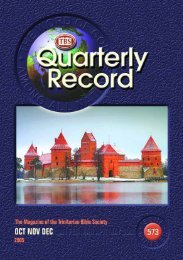
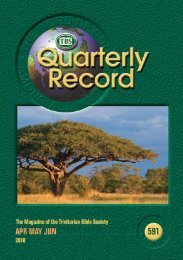
![The Love of the Truth [pdf] - Trinitarian Bible Society](https://img.yumpu.com/49788277/1/184x260/the-love-of-the-truth-pdf-trinitarian-bible-society.jpg?quality=85)
![Bible Word List and Reading Plan [pdf] - Trinitarian Bible Society](https://img.yumpu.com/46882563/1/177x260/bible-word-list-and-reading-plan-pdf-trinitarian-bible-society.jpg?quality=85)
![Click to Download Document [pdf] - Trinitarian Bible Society](https://img.yumpu.com/44904205/1/184x260/click-to-download-document-pdf-trinitarian-bible-society.jpg?quality=85)
![Download Document [pdf] - Trinitarian Bible Society](https://img.yumpu.com/44584740/1/184x260/download-document-pdf-trinitarian-bible-society.jpg?quality=85)
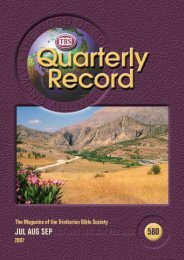
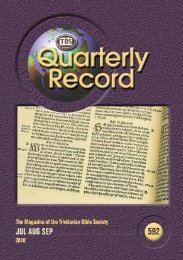
![Download Document [pdf] - Trinitarian Bible Society](https://img.yumpu.com/41007786/1/184x260/download-document-pdf-trinitarian-bible-society.jpg?quality=85)
![Click to Download Document [pdf] - Trinitarian Bible Society](https://img.yumpu.com/40894484/1/188x260/click-to-download-document-pdf-trinitarian-bible-society.jpg?quality=85)

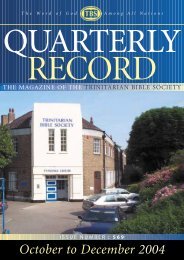
![Download Document [pdf] - Trinitarian Bible Society](https://img.yumpu.com/39425868/1/184x260/download-document-pdf-trinitarian-bible-society.jpg?quality=85)
![Download Document [pdf] - Trinitarian Bible Society](https://img.yumpu.com/39425821/1/184x260/download-document-pdf-trinitarian-bible-society.jpg?quality=85)